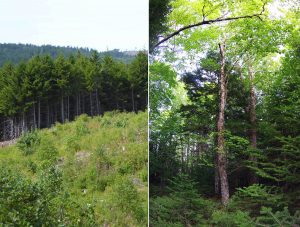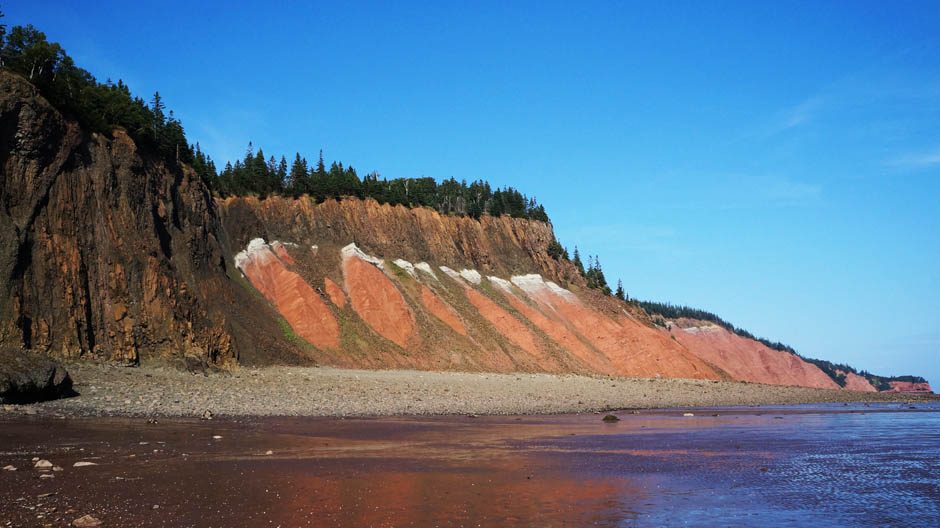We need open, honest, non-personalized and non-politicized discussion of forest GHGs

Two approaches to forest management in Nova Scotia: LEFT: even aged management/short rotations. RIGHT: Selective harvesting, high standing volume and structural integrity is maintained. The latter but not the former would be eligible for carbon offset credits, which could make it the more attractive option for many small woodlot owners in NS, especially those with high volume/older forest stands.
The interview with Dale Prest was also the focus of post on nsforestnotes.ca a few days ago: Dale Prest on “Climate Forests” (Post, May 4, 2018).
The CBC post highlights the main points made by Dale Prest including Prest’s contention that when it comes to forests carbon offsets, Nova Scotia has some key advantages compared to Ontario and BC.
CBC also talked to Saint Mary’s University professor Kate Ervine who is critical of the concept of offsets. “She said the main issue with carbon offsetting is that it doesn’t address the principal source of additional carbon dioxide in the atmosphere: burning fossil fuels…They don’t actually lower their emissions, they’ve bought a credit.”
Kate Ervine is an Associate Professor in International Development Studies at SMU and has published a number of papers on the topic of carbon credits and related matters (view her Faculty Profile). She has written a book titled “Carbon” soon to be published (Fall – 2018) – view description in Good Reads.
Prof Ervinve has been critical of the cap and trade system currently in place for Nova Scotia:
…the program has to be well designed in order to be effective, and Ervine has some concerns. For example, she said Nova Scotia’s proposed emissions cap of 100,000 tonnes might be too high. “Caps are politically set,” she said. “The cap isn’t necessarily in line with what the science tells us is required to have a really effective system to lower greenhouse gases.”
Quebec and Ontario, she added, have caps of 25,000 tonnes a year. She finds that a high cap doesn’t create strong incentives for companies to switch to renewable energy sources…Another concern was Nova Scotia’s plan to give allowances away for free, instead of selling or auctioning them. – Cited in What is cap and trade and how should it work in Nova Scotia? by Mira Diettz Chaisson, The Signal 10 Mar 2018
As I understand some of her concerns about forest carbon offsets, one is that credits may be given for projects or situations that would occur even without offset payments, so in effect, they simply allow a polluter to pollute with no offset.
It is a complex topic involving accounting as well as politics. Certainly Prof. Ervine’s perspectives deserve consideration. However, I hope that she investigates the particular case of Nova Scotia’s forests and forestry in some detail before dismissing the potential of the sorts of programs that Dale Prest would like to see happening, and offers suggestions on how to strengthen the benefits of forest carbon offsets for Nova Scotia, both for landowners and for the planet.
A recent paper examining the California market acknowledged and took into account the issue that concerns Prof Ervine, but concluded that “that California’s forest offset program, comprising a small portion of the state’s mitigation portfolio, does not inhibit overall emissions reductions. Further, the program advances stringent “additionality” of emissions reductions through multiple mechanisms. Finally, mitigation through forest offsets can yield a suite of important co‐benefits”. View Forest offsets partner climate‐change mitigation with conservation
Christa M Anderson Christopher B Field Katharine J Mach 2017. Frontiers in Ecology and the Environment 14 August 2017
View also a comment on the paper in Scientific American.
It ain’t simple. That’s why we need open, honest, non-personalized and non-politicized discussion of forest GHG issues.* In the end, we all want to continue to live and thrive on the planet Earth.
——–
*This comment is not directed at Prof Ervine, she’s a published academic and I suspect she would say the same thing. Rather, I am thinking of the whole area of GHGs related to forests and forestry which is highly politicized.
